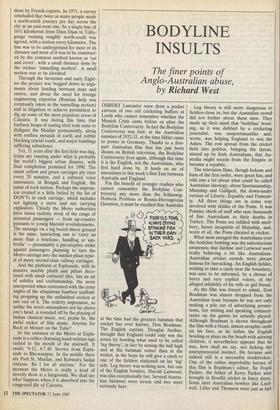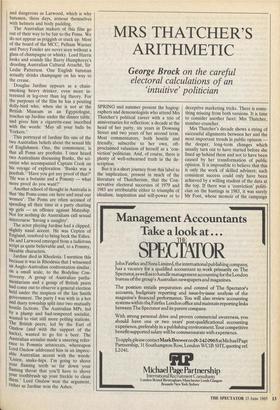B ODYLINE INSULTS
The finer points of Anglo-Australian abuse,
by Richard West
OSBERT Lancaster once drew a pocket cartoon of two old cricketing buffers at Lords who cannot remember whether the Munich Crisis came before or after the Bodyline Controversy. In fact the Bodyline Controversy was first: in the Australian summer of 1932-33, at the time Hitler came to power in Germany. Thanks to a five- part Australian film that has just been shown on British television, the Bodyline Controversy lives again, although this time it is the English, not the Australians, who feel hard done by. It lends an air of uneasiness to this week's first Test between Australia and England.
For the benefit of younger readers who cannot remember the Bodyline Con- troversy any more than the Schleswig- Holstein Problem or Bosnia-Hercegovina Question, it must be recalled that Australia at the time had the greatest batsman that cricket has ever known, Don Bradman. The English captain, Douglas Jardine, thought that England could only win the series by bowling what used to be called leg theory', in fact by aiming the ball high and at the batsman rather than at the wicket, in the hope he will give a catch to one of the fielders stationed on his leg' side. Leg theory was nothing new, but one of the English bowlers, Harold Larwood, was also exceptionally fast. Several Austra- lian batsmen were struck and two were seriously hurt. Leg theory is still more dangerous to fielders close in; but the Australian crowd did not bother about these men. They made up their mind that 'bodyline' bowl- ing, as it was dubbed by a cricketing
journalist, was unsportsmanlike and, worse, was helping England to win the Ashes. The row spread from the cricket field into politics, bringing the threat, stirred up by Irish Australians, that. Au- stralia might secede from the Empire to become a republic.
The television films, though hokum and ham of the first order, were great fun, and told one a lot about what could be called Australian ideology; about Sportsmanship, Mateship and Gallipoli, the down-under version of Liberty, Equality and Fraterni- ty. All three things are in some way involved with dislike of the Poms. It was Pommy chiefs of staff who sent thousands of fine Australians to their deaths in Turkey. The Poms are riddled with snob- bery, hence incapable of Mateship, and, worst of all, the Poms cheated at cricket.
What most enraged the Australians over the bodyline bowling was the subconscious awareness that Jardine and Larwood were really behaving a bit like Australians. Australian cricket crowds were always famous for barracking. An English fielder, waiting to take a catch near the boundary, was sure to be informed, by a chorus of beery and very explicit voices, of the alleged infidelity of his wife or girl friend.
As the film was forced to admit, Don Bradman was almost dropped from the Australian team because he was not only making a pile out of advertising promo- tions, but writing and speaking commen- taries on the games he actually played.
Although Bradman is shown throughout the film with a bland, almost seraphic smile on his face, as he lashes the English bowling or plays on the beach with adoring children, it nevertheless appears that he was, how shall we say, not lacking the entrepreneurial instinct. He became and indeed still is a successful stockbroker.
One of the rather improbable heroes of this film is Bradman's editor, Sir Frank Packer, the father of Kerry Packer who brought in floodlit cricket in fancy dress. Some later Australian bowlers like Lind- wall, Lillee and Thomson were just as fast and dangerous as Larwood, which is why batsmen, these days, armour themselves with helmets and body padding.
The Australian makers of this film go out of their way to be fair to the Poms. We do not appear as priggish or stuck up. Most of the board of the MCC, Pelham Warner and Percy Fender are never seen without a glass of champagne or whisky. Lord Harris looks and sounds like Barry Humphreys's drooling Australian Cultural Attaché, Sir Leslie Patterson, One English batsman actually drinks champagne on his way to the crease.
Douglas Jardine appears as a chain- smoking heavy drinker, even more in- terested in leg-over than leg theory. For the purposes of the film he has a pouting dolly-bird who, when she is not at the British Museum as an Egyptologist, touches up Jardine under the dinner table, and gives him a cigarette-case inscribed with the words: `May all your balls be Yorkers.'
This portrayal of Jardine fits one of the two Australian beliefs about the sexual life of Englishmen. One, the commonest, is that all Poms are pooftahs. I once heard two Australians discussing Banks, the sci- entist who accompanied Captain Cook on his voyage of exploration. `Banks was a pooftah."Have you got any proof of that?' `He was a botanist and a Pommy — what more proof do you want?'
Another school of thought in Australia is that 'the Poms come out here and steal our women'. The Poms are often accused of Spending all their time at a party chatting up girls — an offence against Mateship. Not for nothing do Australians call sexual intercourse 'having a naughty'.
The actor playing Jardine had a clipped, Slightly nasal accent. He was Cepten of England, resolved to bring beck the Eshes. He and Larwood emerged from a ludicrous script as quite believable and, to a Pommy, likeable characters.
Jardine died in Rhodesia. I mention this because it was in Rhodesia that I witnessed an Anglo-Australian confrontation similar, on a small scale, to the Bodyline Con- troversy. A group of Australian parlia- mentarians and a group of British peers had come out to observe a general election held under the auspices of the Ian Smith government. The party I was with in a hot and dusty township split into two mutually hostile factions. The Australian MPs, led by a plump and bad-tempered socialist, wanted to visit still more polling stations. The British peers, led by the Earl of Onslow (and with the support of the hacks), wanted to go for a beer. The Australian socialist made a sneering refer- ence to Pommie aristocrats, whereupon Lord Onslow addressed him in an impecc- able Australian accent with the words: Listen, snake-hips. I'm going to shove Your flaming teeth so far down your flaming throat that you'll have to shove Your toothbrush up your freckle to clean them.' Lord Onslow won the argument, rather as Jardine won the Ashes.



















































 Previous page
Previous page